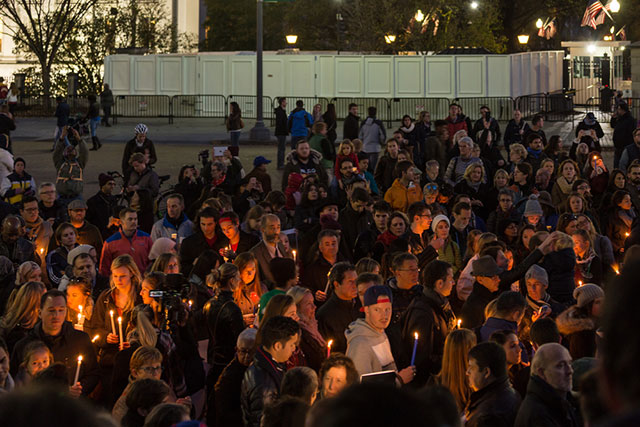
I’m saddened by some of the posts I’m seeing on social media, chastising those who are expressing love and solidarity in the wake of last week’s violence in France. Moments of great empathy are not a social failing. If anything, they are an opportunity to build better and expand our collective compassion. Posts that more or less amount to, “if you care about this, but didn’t post about [insert tragedy here], I’m judging you” help nothing and heal nothing. When people living in a desensitized society have opened their hearts to grieve the suffering of others, there is a potential for a widening dialogue that shouldn’t be lost in the shuffle of social media angst.
This should certainly be a moment of greater realization. It should be a moment of understanding the connectivity of violence and certainly a moment to reflect on what society may have averted its eyes from over time – and of realizing that the recent attacks in Paris, and the violence of imperialism and colonialism, are really all part of the same tragedy. And while we should challenge one another to recognize the connectedness of international violence, and to extend our grief to encompass that which is less familiar, and often unseen within the scope of popular media, spite and vitriol will never build the bonds that will help reshape the course of history for the better.
As a Native woman, I understand the pain of erasure. I know it well. And when I am hurt by it, my anger and sadness are certainly valid. People should be paying attention to the police killings, rampant suicides and ongoing displacement of my people. It’s more than reasonable for people whose pain and loss are invisibilized to express grief and anger that their suffering goes unseen. But for those who would endeavor to lift up those issues in our names, or to speak on behalf of others whose struggles they have not experienced, I think it’s fair to expect a more thoughtful and nuanced approach than I have seen from many this past weekend.
The work of swaying those who don’t understand or agree with you is much more difficult than simply demanding an attitude adjustment. It’s a matter of social transformation, and the work of transformation must be nuanced and constructive. It can at times be fueled by anger. I feel that anger myself, but I do my best to not to allow those feelings to isolate me from people who I believe have the potential to understand and work with me. It’s not easy, and I don’t always succeed in holding back my anger, but for those who are not directly affected by these oppressions, the path of discourse is a much simpler one: broadening empathy.
We know that racism, uneven media coverage and the seeming constancy of some violence play into a larger failure to react, in many instances, but all of this can be overcome, and it won’t be overcome by judgement or snark. It could, however, be overcome by mourning for those lost in Paris, not all of whom were white, as some posts seem to suggest, and opening our hearts a little further to mourn all that we may not have let in. It’s crucial that we see the connections between the violence in Iraq, Beirut, Paris and elsewhere, breathe in the feelings that come with it all, and then build forward in a way that holds us all accountable for what our media covers and what we do to interact with these tragedies.
If that’s the path that people take now, I don’t care about what they didn’t post on Facebook last week. I care about us all opening our eyes a little wider and doing better in the coming week.
You’re not wrong for grieving the harm done in Paris. The answer is more compassion, not less. And vigilance, because we know that this is how the cycle of violence continues, and if we don’t stand in the way of endless war and Islamophobia, there will be more moments of extraordinary violence the world over, and we will have had a hand in each of them, because our country drops the very bombs that radicalize those who would carry out attacks like those of last week.
So watch the backs of those who will be treated as scapegoats in the coming days, and make the connections people need to see about what’s happening, on a larger scale. Demand an end to our ongoing wars, and advocate for those harmed and displaced by those conflicts. And extend love, rather than judgment to those who are hurting, because their hearts are open right now, and that’s an opportunity for us all.
That’s the real work at hand, friends. So let’s handle ourselves accordingly.
Matching Opportunity Extended: Please support Truthout today!
Our end-of-year fundraiser is over, but our donation matching opportunity has been extended! All donations to Truthout will be matched dollar for dollar for a limited time.
Your one-time gift today will be matched immediately. Your monthly donation will be matched for the whole first year, doubling your impact.
This matching gift comes at a critical time. As Trump attempts to silence dissenting voices and oppositional nonprofits, reader support is our best defense against the right-wing agenda.
Help Truthout confront Trump’s fascism in 2026, and have your donation matched now!